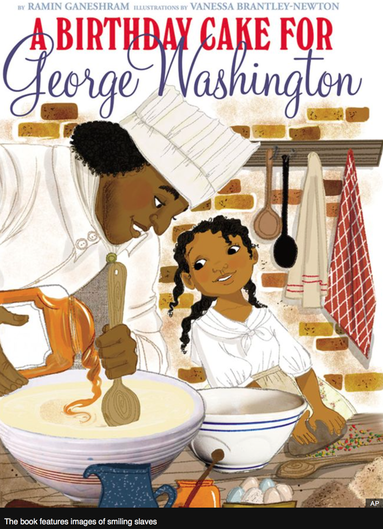Were slaves ever happy? If so, should we be allowed to acknowledge those moments?!
After enduring a storm of criticism over its new children's book, A Birthday Cake for George Washington, Scholastic Publishing announced this week that it would halt distribution of the book. It tells the story of George Washington's cook, Hercules, and his daughter, Delia, facing the challenge of baking the President a birthday cake without sugar.
I would like to describe the book more fully, but Amazon and other distributors no longer sell it, and "scalpers" are asking as much as $1,500 for a copy. Apparently though, Delia and her Dad are pictured smiling throughout the book, and Hercules is said to be proud of his work as chef to President Washington. And therein lies the problem.
The author is at pains to argue in an afterward that slavery was wrong, despite those smiles, and notes that Hercules actually ran away to freedom. (By the way, the author, illustrator, and editor of the book are all African American.) Nevertheless some reviewers have criticized Birthday Cake as an incomplete, even a dishonest, portrayal of slavery. So Scholastic backed down and effectively censured the book from further review.
And that is a shame for scholars, students, and children alike, all of whom might have learned some important lessons from A Birthday Cake for George Washington. I have been studying ways of telling the slavery story for more than 50 years--ever since I attended a class at Berkeley in 1965, where Kenneth Stampp lectured on the themes in his immensely important book, The Peculiar Institution. Before Stampp, the master narrative on slavery in America emphasized the humane owner and the happy slave. Stampp revealed the bankruptcy of that narrative, particularly in his use of runaway slave advertisements, which invariably identified slaves by describing their whipping scars.
We needed then, as we still need today, to be reminded that slavery was forced--often savagely--on an unwilling people. But the fate of a children's book about a black chef and his daughter suggests that we may be diminishing the portrait of slavery by banishing stories that do not fit exactly into the master narrative of unrelenting oppression.
I am teaching a research course this winter on slavery, and we are currently reading Solomon Northup's 12 Years a Slave as well as viewing the movie. Arguably no narrative and no film provide a more devastating indictment of the cruelty of slavery. And yet the real-life victim of kidnapping and torture, Northup himself, includes in his narrative accounts of solicitude by his master, a slave's desire to repay kindness with kindness, and happiness among the slaves. Today in class we read several accounts of the "Birthday Cake" news, and reviewed Solomon Northup's narrative. Among other episodes we recalled:
-- Slave-owner William Ford riding a horse while Northup walked and urging Northup to trade places,
-- a grateful Northup volunteering to work in the Ford garden when not required to do so.
12 Years a Slave makes reference often to a capacity for happiness among slaves. Northup lived a "comparatively happy life" with William Ford. The slave Patsey is capable of "rejoicing in the mere sense of existence." Northup enjoys playing the violin when he is "joyful." And he finds at least five ways to indicate how happy the slaves are during the three-to-six day Christmas holiday. They exhibit "unalloyed and exulting happiness." Happiness "sparkles" in their eyes. And they are "as happy looking mortals as can be found on the face of the earth."
Solomon Northup does tell us that these happy times are but an interlude in a year characterized by toil and fear. But those joyful days are part of the variegated story of slavery, and he chose to include those days in his narrative. We would hardly do justice to Northup if we were to expunge those moments from his written account--as the script does from film version.
By giving into pressure to confine the master slave narrative to a kind of straight jacket, Scholastic Publishing has denied us and our children a valuable avenue into comprehending the rich complexity of the slave experience. This is a shame for modern readers, and arguably it is even unfair to that almost-forgotten father and daughter, Hercules and Delia.
Click here to view a complete list of entries on the American Realities blog...
(You know you want to!)
If you enjoyed this article you may enjoy this article:
"Wishing I were There" -- Time Travel to Hampton Institute Graduation, 1875":


 RSS Feed
RSS Feed